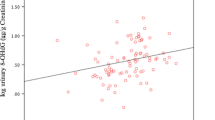Abstract
Background
Vitamins A, E and C, and uric acid, which can scavenge free radicals should also protect DNA from the damage. It is reasonable to assume that agents that decrease oxidative DNA damage should also decrease subsequent cancer development.
Aim of the study
A relationship between basal level of antioxidants (vitamins A, C and E and uric acid) and oxidative DNA damage was assessed. For the first time, the broad spectrum of oxidative DNA damage biomarkers: urinary excretion of 8-oxodG, 8-oxoGua and 5HMUra as well as the level of oxidative DNA damage in leukocytes was analyzed in healthy subjects (n = 158).
Methods
Using HPLC prepurification/isotope dilution GC/MS methodology, we examined the amount of oxidative DNA damage products excreted into urine and the amount of 8-oxodG in leukocytes’ DNA (with HPLC/EC technique). The level of antioxidant vitamins and uric acid was estimated by HPLC technique with fluorimetric and UV detection.
Results
Analyses of relationship between the most common antioxidants (vitamins A, C, E and uric acid) and oxidative DNA damage products reveal weak, statistically significant negative correlation between retinol and all the measured parameters except 5HMUra. Vitamin C negatively correlates with urinary excretion of 8-oxodG and 8-oxoGua. Uric acid revealed statistically significant negative correlation with 8-oxodG in cellular DNA and urinary excretion of 5HMUra, while α-tocopherol correlates negatively only with 8-oxodG in cellular DNA. Good, significant (P < 0.0001), positive correlation (r = 0.61) was noted between urinary levels of the base, 8-oxoGua and the deoxynucleoside, 8-oxodG.
Conclusion
Our results suggest that oxidative DNA damage shows limited but significant response to antioxidants analyzed in this study and is more affected by many other cellular functions like antioxidant enzymes or DNA repair enzymes as well as genetics.


Similar content being viewed by others
References
Block G, Patterson B, Subar A (1992) Fruit, vegetables, and cancer prevention: a review of the epidemiological evidence. Nutr Cancer 18:1–29
ESCODD (2002) Inter-laboratory validation of procedures for measuring 8-oxo-7,8-dihydroguanine/8-oxo-7,8-dihydro-2′-deoxyguanosine in DNA. Free Radic Res 36:239–245
Cooke MS, Evans MD, Dove R, Rozalski R, Gackowski D, Siomek A, Lunec J, Olinski R (2005) DNA repair is responsible for the presence of oxidatively damaged DNA lesions in urine. Mutat Res 574:58–66
Ravanat JL, Guicherd P, Tuce Z, Cadet J (1999) Simultaneous determination of five oxidative DNA lesions in human urine. Chem Res Toxicol 12:802–808
McCall MR, Frei B (1999) Can antioxidant vitamins materially reduce oxidative damage in humans? Free Radic Biol Med 26:1034–1053
Moller P, Loft S (2002) Oxidative DNA damage in human white blood cells in dietary antioxidant intervention studies. Am J Clin Nutr 76:303–310
Rozalski R, Siomek A, Gackowski D, Foksinski M, Gran C, Klungland A, Olinski R (2004) Diet is not responsible for the presence of several oxidatively damaged DNA lesions in mouse urine. Free Radic Res 38:1201–1205
Gackowski D, Kruszewski M, Jawien A, Ciecierski M, Olinski R (2001) Further evidence that oxidative stress may be a risk factor responsible for the development of atherosclerosis. Free Radic Biol Med 31:542–547
Foksinski M, Bialkowski K, Skiba M, Ponikowska I, Szmurlo W, Olinski R (1999) Evaluation of 8-oxodeoxyguanosine, typical oxidative DNA damage, in lymphocytes of ozone-treated arteriosclerotic patients. Mutat Res 438:23–27
Olinski R, Gackowski D, Foksinski M, Rozalski R, Roszkowski K, Jaruga P (2002) Oxidative DNA damage: assessment of the role in carcinogenesis, atherosclerosis, and acquired immunodeficiency syndrome. Free Radic Biol Med 33:192–200
Olinski R, Gackowski D, Rozalski R, Foksinski M, Bialkowski K (2003) Oxidative DNA damage in cancer patients: a cause or a consequence of the disease development? Mutat Res 531:177–190
Jaruga P, Jaruga B, Gackowski D, Olczak A, Halota W, Pawlowska M, Olinski R (2002) Supplementation with antioxidant vitamins prevents oxidative modification of DNA in lymphocytes of HIV-infected patients. Free Radic Biol Med 32:414–420
Rumsey SC, Kwon O, Xu GW, Burant CF, Simpson I, Levine M (1997) Glucose transporter isoforms GLUT1 and GLUT3 transport dehydroascorbic acid. J Biol Chem 272:18982–18989
van den Berg H, van Vliet T (1998) Effect of simultaneous, single oral doses of beta-carotene with lutein or lycopene on the beta-carotene and retinyl ester responses in the triacylglycerol-rich lipoprotein fraction of men. Am J Clin Nutr 68:82–89
Enomoto A, Endou H (2005) Roles of organic anion transporters (OATs) and a urate transporter (URAT1) in the pathophysiology of human disease. Clin Exp Nephrol 9:195–205
Ahlemeyer B, Bauerbach E, Plath M, Steuber M, Heers C, Tegtmeier F, Krieglstein J (2001) Retinoic acid reduces apoptosis and oxidative stress by preservation of SOD protein level. Free Radic Biol Med 30:1067–1077
Collins AR, Olmedilla B, Southon S, Granado F, Duthie SJ (1998) Serum carotenoids and oxidative DNA damage in human lymphocytes. Carcinogenesis 19:2159–2162
Moller P, Loft S (2006) Dietary antioxidants and beneficial effect on oxidatively damaged DNA. Free Radic Biol Med 41:388–415
Phillips DH (2002) Smoking-related DNA and protein adducts in human tissues. Carcinogenesis 23:1979–2004
Acknowledgements
The authors acknowledge financial support from the State Committee for Scientific Research grant PBZ-KBN-094/P06/2003. The authors of this paper are partners of ECNIS (Environmental Cancer Risk, Nutrition and Individual Susceptibility), a network of excellence operating within the European Union 6th Framework Program, Priority 5: “Food Quality and Safety” (Contract No 513943). R.O. was supported by a Foundation for Polish Science fellowship.
Author information
Authors and Affiliations
Corresponding author
Rights and permissions
About this article
Cite this article
Foksinski, M., Gackowski, D., Rozalski, R. et al. Effects of basal level of antioxidants on oxidative DNA damage in humans. Eur J Nutr 46, 174–180 (2007). https://doi.org/10.1007/s00394-006-0642-7
Received:
Accepted:
Published:
Issue Date:
DOI: https://doi.org/10.1007/s00394-006-0642-7




